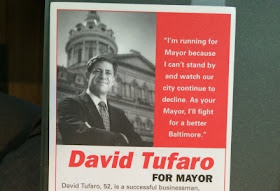On first blush the column by the Yale-trained historian with a Penn doctorate in urban planning seems to make sense when he enumerates Baltimore's well-known pathologies and notes conditions that anybody who knows Baltimore, has to concede are accurate: poor school performance, high taxes combined with low property values and high crime.
 |
| Confusing cause and effect |
But his reasoning is hairy throughout. In a view usually limited to politicians, he vastly overestimates the effects of policies. He doesn't criticize the weakness of the current administration's policies to effectively counter-steer the larger context. Instead, he identifies current local policies as the causes of the problems even if they are based on evidence that the previous old style policies (which Tufaro seems to prefer) were ineffective.
Right in the first paragraph about schools and education his logic becomes astounding. After the well worn old hats of "top heavy" bureaucracy and "protecting ineffective teachers" he concludes that the best teacher talent is kept out by "cumbersome state teacher certification" requirements. Aside that this is outside the City's control, since when does careful certification keep talent out? Then he goes on to list that "projects" are often allowed to substitute "required exams". Isn't that what pedagogians have always demanded: Problem based learning instead of mindless exams? He also complains that the system is trying to reduce the high number of suspensions. This, too, is a policy educators have asked for when for years they warned that excluding record numbers of students from school is not furthering education but delivers students straight into the street system of crime. To top it off, Tufaro blames poor school performance on "squandering $1 billion on new and renovated schools" and their green building requirements. This after decades of complaints that city school buildings are in such bad shape that buckets have to catch rain water and drinking fountains had to be shut off because of lead in the water. Educators and experts have shown that if children are sent into such poor physical learning environments, they are told from the onset that not only do they not count as real people, but that learning isn't considered worth anything in the society they live. As for the green standards: They tell students to be good stewards of the environment and they save operating cost in the long run when the city has to maintain these buildings. Hard to see what should be wrong with this.
That is not to say that anyone interested in the $1 billion school construction program shouldn't take a good hard look at how the program is run by the Stadium Authority and why its scope has been reduced several times because of cost overruns.
 |
| Mayoral candidate 1999 |
Tufaro's column then goes straight on to plastic bags and the minimum wage, both local bills that have been unfortunately defeated so far, but he blames them for Baltimore's ills anyway.
Finally, he blames crime on the "revolving door" for criminal juveniles and complains that the public is focusing on violence committed by police instead on the violence in the streets. He apparently fails to see the connection between the two issues. Violence in the streets is sky-high because trust in police is at a record low, with good reason as one can read in the paper on a daily base. This isn't because of lenient criminal justice, but because the police has proven to be far more rotten than many wanted to believe. That problem cannot be overcome with simply jailing more people.
 |
| Whitehall Mill |
Tufaro concludes that " even winning the Amazon HQ2 would not make these problems disappear." Finally one has to agree with him. But this final score doesn't make his earlier diagnosis any more correct.
It looks like it is a good thing that Tufaro didn't become Mayor back in 1999 and instead continued to do his successful development projects such as Waterloo Place in Mt Vernon, the Montgomery Ward redevelopment on Washington Boulevard, Mill #1, and Whitehall Mill, both on Falls Road. Those projects have helped to make Baltimore a better place. His creative (and green) adaptive reuse projects are also evidence of a time when Baltimore had thriving industries that no longer exist.
Klaus Philipsen, FAIA
Updated for typos
Due to the holidays and extended travel Community Architect Daily will be less regular in the next four weeks
No comments:
Post a Comment